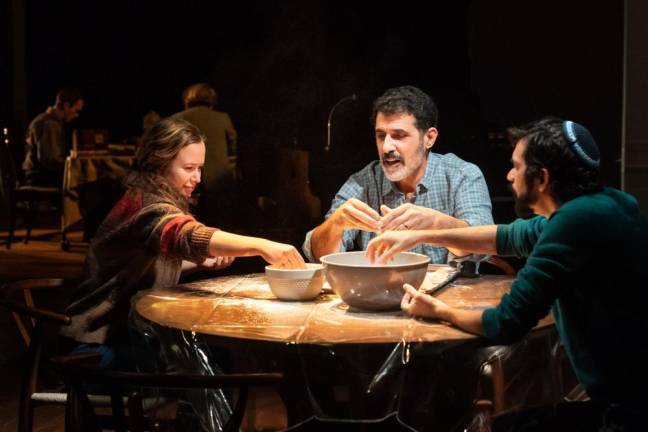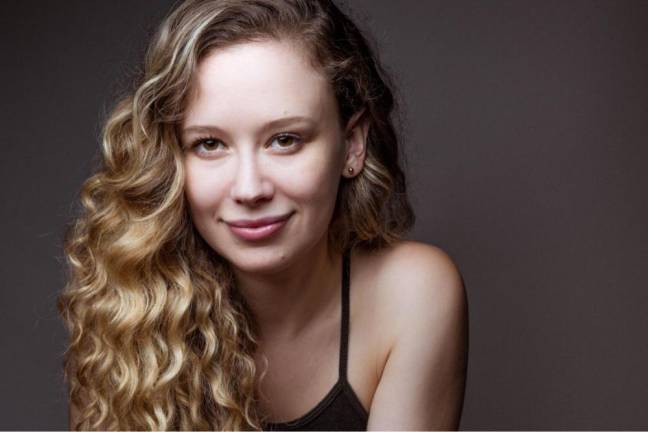A Star of Family Dramas
Molly Ranson on “Prayer for the French Republic,” a play about antisemitism


Actress Molly Ranson has made a career of starring in family dramas. Ranson first came to prominence when she made her Broadway debut in the Pulitzer-prize winning play “August: Osage County,” which she later performed on the West End in London and at the Sydney Opera House in Australia. She has since become a darling of Off-Broadway, performing in the searing comedy “Bad Jews” at the Roundabout, the title role in the musical “Carrie” at MCC, and “Linda” at Manhattan Theatre Club. She now rejoins “Bad Jews” playwright Joshua Harmon at Manhattan Theatre Club for the New York premiere of “Prayer for the French Republic,” a play about five generations of a Jewish family in Paris facing antisemitism in the 1940s and also in 2017.
Ranson plays the character Molly, a young college student who learns when visiting her family that when it comes to Israel, Judaism, and life in general, she does not have all the answers. We sat down with Molly to talk about returning to the theater after COVID-19, her character’s love affair with her cousin and what it takes to make it in show business.
What is Molly’s journey in this show? How does she change from the beginning of the show to the end?
Well, I think that, initially, she’s a very opinionated person. And she’s young. She’s a college student, and thinks that she, you know, has some clarity about what her views are in life and I think that when she goes through this semester abroad and is visiting this family during the weekends throughout the semester, she starts to realize that maybe she doesn’t know as much as she thought that she knows ... particularly Israel and Judaism and identity, that it is a much more nuanced and complex discussion than she’s even been aware of.
I think that she starts to realize that there are other sides to the story and that people make their own decisions based on a number of historical events and inherited traumas and what not, and that I think by the end, she is less judgmental and less strident on her views ... And is open to learning more and not judging people for the decisions that they make.
This play deals with a lot of important topics such as the Israeli-Palestinian conflict, nationalis, and antisemitism. Did doing this play change your views on any of these subjects?
There’s so much in the play that I really do feel like I still am learning something about it every night ... And there are certainly perspectives that I’d never considered. I’m so lucky to be able to listen to Elody’s monologue during that bar scene every night. [She makes some] really fantastic points that I’d never really thought of ... And even lays out all these statistics and numbers about why we care so much about Israel when India is like a hundred times larger ... So I feel like I’m still learning about it every night and I would never, you know, say that my views are set in one direction or another, because there’s always so much to learn, even just doing this play.
In the play, Molly falls in love with Daniel, a religious Jew. Part of the reason why she’s attracted to him is his faith. Why do you think his faith peaks her interest so much?
It is because he’s framing religion in a way that she’d never heard before. And she’s really judgmental towards religion generally and sees all the issues it’s created in the world historically, and he is talking about how he came to it, because he was grateful for snow and being able to appreciate the beauty of nature. And that, I think, is so moving and moving to her. Because I think she appreciates those things as well, but had never made a connection to go to synagogue because of that ... She’s just struck by that, and it opens her eyes to a new way of understanding what is meaningful to a person and it moves her and brings them together.
Daniel, your love interest in the show, is also your cousin. And I was wondering if you find this odd or has doing this play opened up your mind as to what love can look like and what different forms it can take?
(Laughs) It is funny and it is interesting — different audiences have different responses to it ... I’ve had some people come up to me after and be like “that’s weird,” like, “why is that part of the play?” It also is kind of interesting, because I don’t think it really is as noticed as much, but Irma and Adolphe (two other characters in the play), you know, in the 1940s scenes are technically first cousins, they’re actually first cousins and married and had a family. And you know people, many years ago used to do that and it wasn’t considered strange. So, I don’t know, I mean I don’t think I’m going to date my cousin! (laughs) But, you know, to each their own.
What moves you most about doing this show?
I mean, for me, this is my first play back since the pandemic. And I didn’t know what it would feel like to be doing a play after all this time, after two years off ... And being pretty socially isolated from people. It felt like, “how could I possibly go on a stage in front of the hundred people,” like “what will that feel like after being so isolated for so long?” And then, just that first, that first preview, I just remember walking on stage and just getting very emotional, just wanting to cry, and I didn’t, because, I can’t be crying in that first scene, it’s not what my character’s doing. But just feeling like, here we are doing theater during this kind of crazy moment in the world, and people have come out and are gathering to do this ancient ritual thing that is the theater, and to be able to do that after a global pandemic, is extremely meaningful to me.
Especially Josh’s play, I mean he’s my favorite playwright, and to be able to do this gorgeous play that he wrote at this time in history, under these circumstances ...That is really meaningful to me.
What advice would you give to a young actress just starting out in the business?
I would say most of all is to kind of...trust your own uniqueness, and lean into whatever your own unique traits are and peculiarities, because that’s generally what will help you get roles in this business, I think ... When you’re really trusting in what you actually bring to the table and making roles your own and not trying to kind of morph yourself into what someone else would do in a role or what you think they want, it’s always kind of best, from my experience, to kind of, yeah, trust that there’s only one you, and whatever you bring to the table is what’s going to get you jobs ultimately.